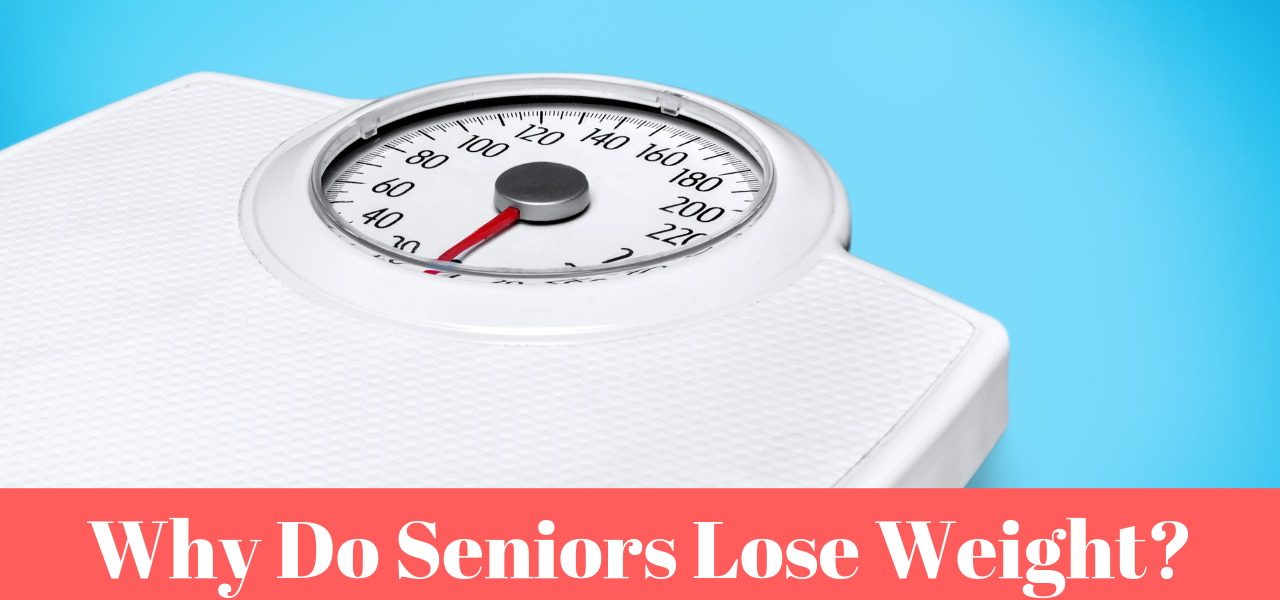
Dropping unnecessary pounds is usually a good thing, especially for seniors carrying excess weight. However, seniors are at a high risk for involuntary weight loss. While 13% of the general population experiences unintentional weight loss, nearly 27% of seniors over the age of 65 drop weight involuntarily. Unintentional weight loss can be a sign of a more serious underlying health issue and, if not managed properly, can have a negative impact on overall health and wellness.
Learn more about the potential causes of unintentional weight loss in seniors and how you can help keep your senior loved one living and eating well.
5 Common Causes of Weight Loss in Seniors
Most medical professionals define unintentional weight loss as a 5% – 10% decrease in body weight over 1 to 12 months, and more specifically, a 5% loss over a 6-month period. There are several reasons this can occur in seniors, including the natural aging process. After the age of 30, people usually experience muscle atrophy, loss of cells in the liver and kidneys, and bones become less dense. Additionally, tissue loss reduces the amount of water in the body. Along with aging comes other conditions that can make it more difficult for seniors to maintain a healthy weight.
1. Loneliness and social isolation
Unexplained and unintentional weight loss in senior loved ones may indicate loneliness or isolation. Feelings of loneliness and social isolation can lead to decreased appetite or willingness to cook and prepare food, leading to weight loss. Social isolation can also lead to depression, also associated with weight loss.
Experience Leisure Care Senior Living

The Village at Unity & The Hamlet
Independent Living, Assisted Living, and Memory Care in Rochester, New York
2. Medication
The side effects of certain medications is a major source of weight loss for seniors. In fact, polypharmacy (taking multiple medications) has been shown to interfere with taste and even cause anorexia. Other side effects of medications commonly taken by seniors that can cause weight loss include altered taste or smell, dry mouth, nausea, and vomiting.
3. Chronic physical illness
Chronic disease like cancer and dementia can lead to weight loss in seniors. Cancer is the leading cause of unintentional weight loss in seniors, accounting for 24% – 38% of all cases. Additionally, dementia can alter taste and smell senses, decreasing appetite. Other chronic illnesses that can lead to weight loss include Parkinson’s disease, thyroid issues, uncontrolled diabetes, gastrointestinal issues, and heart disease.
4. Mental illness
Weight loss is a key symptom of depression and mental illness. Often present in people with bipolar, personality, and anxiety disorders, weight loss is a crucial symptom of mental illness. Weight loss in seniors can also indicate substance abuse and alcoholism.
5. Decreased ability to perform activities of daily living (ADLs)
The ability to perform ADLs can decrease with age. As seniors stop driving, trips to the grocery story require more planning and effort. It can be more difficult to cook a healthy meal and keep healthy foods stocked in the pantry. As daily living skills become increasingly difficult, grocery shopping and maintaining a healthy caloric intake can become hard to manage.
Seeking Help for Unintentional Weight Loss
Unintentional weight loss is a common condition among seniors but it is often associated with declining health. Seeking medical attention for unintentional weight loss is important for early intervention and can even lead to early detection of underlying medical issues.
As a general rule, it’s wise to seek medical attention for losing 5% or more of body weight within 6 – 12 months. A medical professional will be able to walk through family history, perform a physical exam, and even order blood work or body scans to test for any causes of weight loss.
Tips for Seniors to Maintain a Healthy Weight
While unintentional weight loss is common among older adults, there are steps to take to prevent weight loss and maintain a healthy weight through aging.
- Develop and maintain a regular exercise routine
- Eat breakfast every day
- Choose foods that are in high in protein
- Eat foods that are high in fiber (i.e. whole grain bread, beans, vegetables, fruit)
- Stay hydrated
- Build strong relationships with family and friends
- Join a walking group and make exercise a social activity
- Prioritize healthy sleep habits
- Limit sugars and other “empty calories”
- Incorporate strength training in your exercise routine
- Consider moving to senior living
If managing your weight and preparing healthy meals seems out of reach, consider a move to senior living. Our communities offer a wide range of senior care services and feature an on-site restaurant with diverse menus, seasonal selections, fresh and locally sourced foods, and a dynamic social calendar – all designed to help seniors live and eat well.
How do you maintain a healthy weight and avoid unintentional weight loss? Share your tips with us in the comments below.
Find a Leisure Care Community
Better with age, exceptional with us! Come and see how Leisure Care communities are helping seniors rediscover (and sometimes reinvent) themselves.







